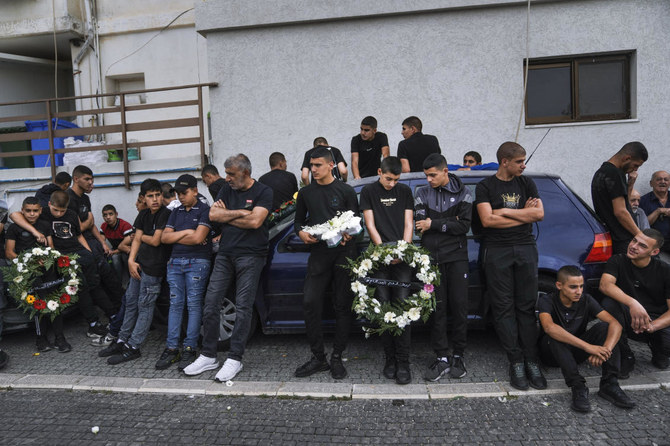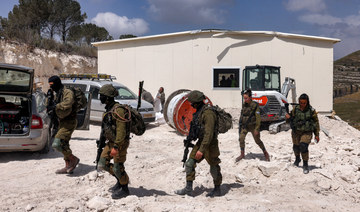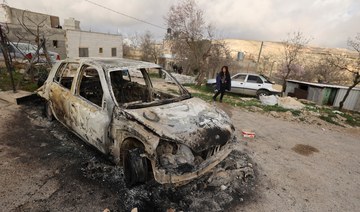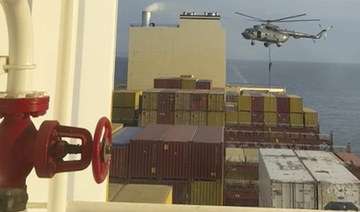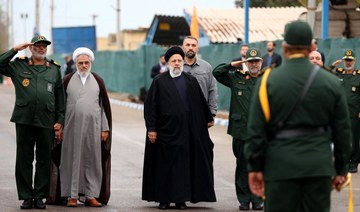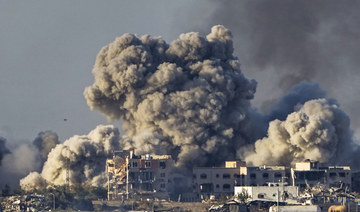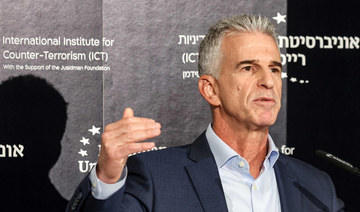LOD: A relentless wave of violent crime within Israel’s Palestinian minority is turning cities and towns into bloody battlefields, exasperating a community feeling increasingly forsaken by Israeli authorities.
Anger over the mounting insecurity is directed at Israel’s government and its ultranationalist minister in charge of police, Itamar Ben-Gvir. Critics say that with his history of anti-Arab rhetoric, he cannot be trusted to combat the rising scourge.
The skyrocketing violence lays bare the deep inequities in Israeli society, with Arabs facing years of discrimination that activists say laid the groundwork for the unabating bloodshed.
More than 100 people have been killed in violent crime in Arab communities this year, nearly three times higher than at the same time last year, according to the Abraham Initiatives, a group that promotes Jewish-Arab coexistence and safe communities. It also is more than three times the murder rate in the majority Jewish sector, according to official figures, despite Arabs making up just a fifth of the country’s population of 9.7 million.
Authorities say they are trying their best. But activists see a direct link between the soaring figures and Prime Minister Benjamin Netanyahu’s government. The coalition, which includes ultranationalist factions with anti-Arab hues, took office in late December.
The head of one of those parties, Jewish Power’s Ben-Gvir, has made racist remarks and before entering politics was convicted of incitement to violence and support for a Jewish terror group. As national security minister, he now oversees the country’s police force.
“Will a person who is busy making racist comments against Arabs protect them,” said Thabet Abu Rass, co-director of the Abraham Initiatives. “We are citizens of this country. We deserve to feel secure like anyone else in this country. And that is his responsibility.”
Israel’s Palestinian minority, which makes up 20 percent of the country’s population, has been convulsed by violent crime in recent years involving criminal gangs and family disputes.
Activists say Israeli authorities have historically ignored deadly crime among Arabs, doing little to deter violence or hold criminals to account. They say that sense has deepened under the current government. Of the 100 or so people killed this year, police have brought charges in just over 10 cases, according to Abu Rass.
Ben-Gvir has pledged to serve all Israelis. But the community views his past remarks and perceived neglect of the crisis as a sign that the government isn’t looking out for them.
Earlier this month, five people were killed when a gunman opened fire at a car wash near the biblical city of Nazareth, and the shooter is not known to have been caught. In April, the bodyguard for the mayor of an Arab city was shot and killed outside the mayor’s home.
Women and children have not been spared, among them an 18-year-old killed recently who had reportedly received threats over her sexual orientation. Two toddler siblings and their mother were allegedly killed by their father in May.
Shootings are so common in some places that residents fear leaving their homes, not only to avoid getting hurt but also to make sure they don’t accidentally become witnesses to a crime and fall into the killers’ sights.
“We leave the house, we’re scared. The kids are at school, I am afraid for them. I am always thinking ‘will my son return home or not?’” said Mirvat Saleh, 48, a plant and flower vendor at a market in Lod, a mixed Arab-Jewish city in central Israel rife with violence.
Under Ben-Gvir’s leadership, critics say the police is in disarray, with a crisis in confidence within the ranks, including spats between the minister and the police chief, and a series of departures by top officers, including the head of the unit fighting crime in the Arab population.
Ben-Gvir says he is dealing with manpower shortages that have been complicated by weekly mass protests against a government plan to overhaul the judiciary that need securing.
“The police chief and I are working hard,” Ben-Gvir said after the five people were killed near Nazareth. “We are trying to address the root problems.”
Ben-Gvir, whose office did not respond to requests for comment, has pushed for the establishment of a new ” national guard,” which he says will increase community policing. Critics say the guard, which would report directly to Ben-Gvir, would amount to a personal militia for the minister.
Netanyahu says his governments have over the years poured resources into fighting crime. Now, he has met with Arab leaders and pledged to crack down, established a committee to try to tackle the crime and even promised to enlist the Shin Bet domestic security agency.
“We are determined to restore law and order in the face of this violent crime. We will do whatever is necessary,” Netanyahu said.
The security agency, whose main work is to keep tabs on Palestinian militants, has been wary of using its spying tools on Israeli citizens in the past. Israeli media have reported its leaders expressing similar concerns now.
While successive governments have struggled to contain the violence, critics say the tone under Netanyahu’s current coalition has ruptured trust. One lawmaker from Ben-Gvir’s party livestreamed himself making slurs at Arab legislators in parliament. The Netanyahu-appointed police chief reportedly said it was the “nature” and “mentality” of Arabs to kill. Involving the Shin Bet, which is deeply mistrusted by Palestinian citizens, is another sign of the tone deafness, critics say.

The crime is rooted in deeper underlying issues that have plagued the community for decades, activists say.
Israeli Arab citizens are descendants of Palestinians who remained within the borders of what became Israel in 1948. Members of the community have reached the highest echelons of government, business and other fields.
But while they tend to be better off than their Palestinian brethren in the West Bank and Gaza, Israel’s Palestinian citizens are generally poorer and less educated than Jews and have long faced neglect or discrimination in policing, public services and housing.
Those societal issues fuel the violence, said Wisal Raed, who focuses on crime in the Arab population at Sikkuy-Aufoq, a group that advocates for equality between Arabs and Jews.
She said a historic lack of access to bank loans drives many to turn to crime families for capital, entangling themselves in potentially dangerous business.
She also pointed to a crisis of space in Palestinian communities, where land is hard to come by, not only for housing, but even parking spots because of planning challenges sometimes stymied by the state. Issues like those ramp up already simmering disputes that descend into violent feuds.
“If the government continues to neglect these spheres, even if the police does what needs to be done,” she said, “the root problem won’t be dealt with.”



